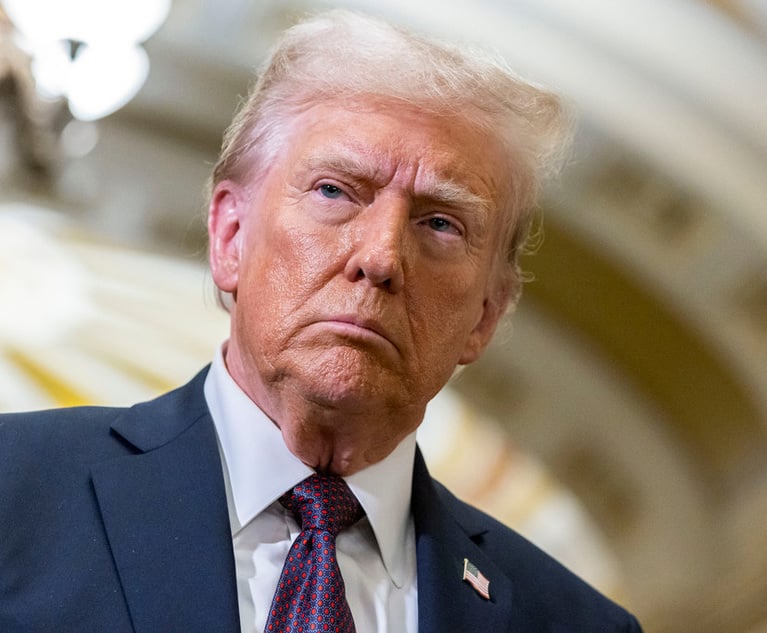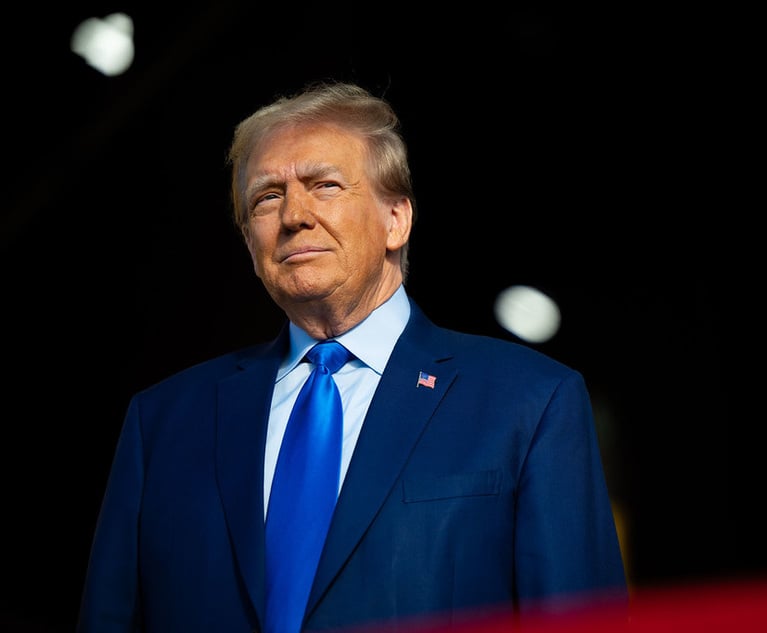Citing 'Overwhelming Evidence' of Guilt, Judge Rejects Michael Avenatti's New Trial Bid in Nike Extortion Case
The decision from U.S. District Judge Paul Gardephe distinguishes between the prosecution teams in New York and California, a crucial legal finding as Avenatti pursues appeals.
February 09, 2022 at 07:01 PM
7 minute read
 Michael Avenatti arrives at a Manhattan federal courthouse on Feb. 3, 2022. Photo: Ryland West/ALM
Michael Avenatti arrives at a Manhattan federal courthouse on Feb. 3, 2022. Photo: Ryland West/ALM
A New York federal judge on Wednesday rejected Michael Avenatti's argument for a new trial in his Nike extortion case, saying financial information about his law firm in the separate client fraud case in California is irrelevant and not exculpatory.
 U.S. District Judge Paul G. Gardephe of the Southern District of New York.
U.S. District Judge Paul G. Gardephe of the Southern District of New York. U.S. District Judge Paul Gardephe of the Southern District of New York also said "overwhelming evidence" of Avenatti's guilt means the documents produced by financial analyst John Drum for the U.S. Attorney's Office in Los Angeles showing how Avenatti misappropriated client money wouldn't change the outcome of the Nike trial, and he distinguished between the prosecution teams in New York and California.
That distinction is a crucial legal finding as Avenatti tries to carry the momentum of his California mistrial into his New York cases.
Gardephe in July ruled the prosecution teams "engaged in joint and coordinated fact gathering" regarding Avenatti's paralegal, Judy Regnier. But the judge's 23-page ruling said that's not enough "to demonstrate that the two offices were engaged in a joint investigation and prosecution," and he declined Avenatti's request to issue an indicative ruling to the U.S. Court of Appeals for the Second Circuit saying he'd grant a new trial if he had jurisdiction. He also noted that while the mistrial in California was prompted by client financial information, including Tabs3 software data, on Avenatti's seized law firm servers, the request before Gardephe was based not on that information but on Drum's expert analysis.
"As noted earlier, the charges in the California action are entirely unrelated to those in New York, and the Drum documents cover an earlier time period not relevant to the time at which Avenatti was extorting Nike," Gardephe wrote. The ruling follows Gardephe's order for transcripts of the California proceedings before U.S. District Senior Judge James Selna of the Central District of California beyond what Avenatti's lawyer, Benjamin Silverman, provided with his request.
New York prosecutors never possessed Drum's analyses, and they weren't privileged to them until after the Nike trial concluded. That finding alone is "fatal to any Brady claim premised on the Drum documents," Gardephe wrote, referencing Brady v. Maryland regarding prosecutors' duties to disclose exculpatory evidence.
But Gardephe also said Drum's documents aren't exculpatory in the Nike case because they don't cast doubt "on the evidence of Avenatti's financial condition that was introduced at trial."
Drum's analyses covered Avenatti's law firm finances between 2009 and 2018, during which California prosecutors say he was bilking five clients out of millions of dollars, while the Nike case focused on Avenatti's financial condition in March 2019. He didn't consider the $11 million in judgments against Avenatti at the time of the Nike extortion, the November 2018 eviction from his firm's high-rise office in Newport Beach, California, and his statements to Regnier that he was "working on something" that would address his firm's debt and allow Avenatti to "start a new firm," according to Gardephe's ruling. Prosecutors argued in trial that "something" was Avenatti's extortion of Nike, "which he hoped would yield $15 million to $25 million."
The judge also said the primary evidence against Avenatti was "his own audio and video-recorded statements, in which he repeatedly and vividly" threatened Nike and "acted in a manner that was clearly adverse to his client's interest." Gardephe called prosecutors' limited evidence about Avenatti's financial condition "no more than a footnote during the proof at trial, because the court excluded most of the government's evidence concerning Avenatti's allegedly poor financial condition."
"As the court stated in making this ruling, the lure of the $15 to $25 million that Avenatti was demanding from Nike was sufficient to explain his financial motive," Gardephe said.
 U.S. District Judge Jesse M. Furman leaves the federal courthouse at 500 Pearl St. in Manhattan with his law clerks. (Photo: Meghann M. Cuniff/ALM)
U.S. District Judge Jesse M. Furman leaves the federal courthouse at 500 Pearl St. in Manhattan with his law clerks. (Photo: Meghann M. Cuniff/ALM) Gardephe's ruling follows an oral ruling by his Southern District colleague U.S. District Judge Jesse Furman that the prosecution team in the Stormy Daniels wire fraud trial is a separate unit from the California prosecutors pursuing the client fraud charges.
Furman said a more detailed written ruling is forthcoming, but he emphasized in court that New York prosecutors never had the law firm server data that derailed Avenatti's California trial, while Avenatti has had all of it since September per an order from Selna in the Central District of California.
Avenatti said the data isn't in an accessible form, and he asked Selna to order prosecutors to release data related to Daniels just before trial began last month. Selna declined, saying he didn't have jurisdiction, but Furman said in a pretrial conference he understood how the information could be relevant to Avenatti's defense.
Furman said he was considering contacting Selna to find about more about the reasoning behind the judge's ruling. But the next week, Furman said he'd decided the issue wasn't relevant to the case, and he restricted Avenatti from questioning witnesses about the data in his cross-examinations.
Gardephe's new ruling comes as Avenatti is behind bars in Los Angeles after surrendering Monday at about 4:15 p.m. at the federal courthouse in Santa Ana, California, per an agreement with New York prosecutors that Furman solidified in an order Monday morning.
Avenatti asked Selna to order he be housed at the jail in Santa Ana so he can be closer to his standby counsel in his California case. But, in another move exemplifying the tricky jurisdictional issues in Avenatti cross-country criminal prosecutions, Selna declined, noting he wasn't the judge who remanded him.
So as of Wednesday, Avenatti is listed as an inmate at the Metropolitan Detention Center in downtown Los Angeles. And he could stay in custody a long time. Not only does he have the 30-month prison sentencing pending in the Nike case, he's to be sentenced by Furman on May 24 in New York for the wire fraud and aggravated identity theft convictions the Daniels jury handed down last week.
Prosecutors in the Daniels case told Furman the amount of money at issue is $148,750, which is the amount of the third book payment Daniels testified she's never received. Wire fraud sentences depend on the amount of money involved, so that coupled with an additional two years for aggravated identify theft could give Avenatti about four years in prison under U.S. sentencing guidelines. The California case is on appeal to the Ninth Circuit, with oral argument scheduled March 10, but it could bring many more years in prison if it ends up in conviction.
Still, nothing's final yet. Avenatti's appeal in the Nike case with the Second Circuit is due March 14 after the court granted an extension request last month from his lawyer.
Avenatti also vowed to appeal the convictions in the Daniels case, telling reporters last week: "I'm very disappointed in the jury's verdict. I am looking forward to a full adjudication of all the issues on appeal."
This content has been archived. It is available through our partners, LexisNexis® and Bloomberg Law.
To view this content, please continue to their sites.
Not a Lexis Subscriber?
Subscribe Now
Not a Bloomberg Law Subscriber?
Subscribe Now
NOT FOR REPRINT
© 2025 ALM Global, LLC, All Rights Reserved. Request academic re-use from www.copyright.com. All other uses, submit a request to [email protected]. For more information visit Asset & Logo Licensing.
You Might Like
View All
Prosecutors Seek 15 Years in Prison for Ex-US Sen. Robert Menendez

'The Most Sensible Sentence': Trump Sentenced to Unconditional Discharge in Manhattan Criminal Case

New York Court of Appeals Blocks Trump Attempt to Stay Friday Sentencing

U.S. Supreme Court Denies Trump Effort to Halt Sentencing
Trending Stories
- 1Supreme Court Takes Up Challenge to ACA Task Force
- 2'Tragedy of Unspeakable Proportions:' Could Edison, DWP, Face Lawsuits Over LA Wildfires?
- 3Meta Pulls Plug on DEI Programs
- 4On the Move and After Hours: Meyner and Landis; Cooper Levenson; Ogletree Deakins; Saiber
- 5State Budget Proposal Includes More Money for Courts—for Now
Who Got The Work
Michael G. Bongiorno, Andrew Scott Dulberg and Elizabeth E. Driscoll from Wilmer Cutler Pickering Hale and Dorr have stepped in to represent Symbotic Inc., an A.I.-enabled technology platform that focuses on increasing supply chain efficiency, and other defendants in a pending shareholder derivative lawsuit. The case, filed Oct. 2 in Massachusetts District Court by the Brown Law Firm on behalf of Stephen Austen, accuses certain officers and directors of misleading investors in regard to Symbotic's potential for margin growth by failing to disclose that the company was not equipped to timely deploy its systems or manage expenses through project delays. The case, assigned to U.S. District Judge Nathaniel M. Gorton, is 1:24-cv-12522, Austen v. Cohen et al.
Who Got The Work
Edmund Polubinski and Marie Killmond of Davis Polk & Wardwell have entered appearances for data platform software development company MongoDB and other defendants in a pending shareholder derivative lawsuit. The action, filed Oct. 7 in New York Southern District Court by the Brown Law Firm, accuses the company's directors and/or officers of falsely expressing confidence in the company’s restructuring of its sales incentive plan and downplaying the severity of decreases in its upfront commitments. The case is 1:24-cv-07594, Roy v. Ittycheria et al.
Who Got The Work
Amy O. Bruchs and Kurt F. Ellison of Michael Best & Friedrich have entered appearances for Epic Systems Corp. in a pending employment discrimination lawsuit. The suit was filed Sept. 7 in Wisconsin Western District Court by Levine Eisberner LLC and Siri & Glimstad on behalf of a project manager who claims that he was wrongfully terminated after applying for a religious exemption to the defendant's COVID-19 vaccine mandate. The case, assigned to U.S. Magistrate Judge Anita Marie Boor, is 3:24-cv-00630, Secker, Nathan v. Epic Systems Corporation.
Who Got The Work
David X. Sullivan, Thomas J. Finn and Gregory A. Hall from McCarter & English have entered appearances for Sunrun Installation Services in a pending civil rights lawsuit. The complaint was filed Sept. 4 in Connecticut District Court by attorney Robert M. Berke on behalf of former employee George Edward Steins, who was arrested and charged with employing an unregistered home improvement salesperson. The complaint alleges that had Sunrun informed the Connecticut Department of Consumer Protection that the plaintiff's employment had ended in 2017 and that he no longer held Sunrun's home improvement contractor license, he would not have been hit with charges, which were dismissed in May 2024. The case, assigned to U.S. District Judge Jeffrey A. Meyer, is 3:24-cv-01423, Steins v. Sunrun, Inc. et al.
Who Got The Work
Greenberg Traurig shareholder Joshua L. Raskin has entered an appearance for boohoo.com UK Ltd. in a pending patent infringement lawsuit. The suit, filed Sept. 3 in Texas Eastern District Court by Rozier Hardt McDonough on behalf of Alto Dynamics, asserts five patents related to an online shopping platform. The case, assigned to U.S. District Judge Rodney Gilstrap, is 2:24-cv-00719, Alto Dynamics, LLC v. boohoo.com UK Limited.
Featured Firms
Law Offices of Gary Martin Hays & Associates, P.C.
(470) 294-1674
Law Offices of Mark E. Salomone
(857) 444-6468
Smith & Hassler
(713) 739-1250






